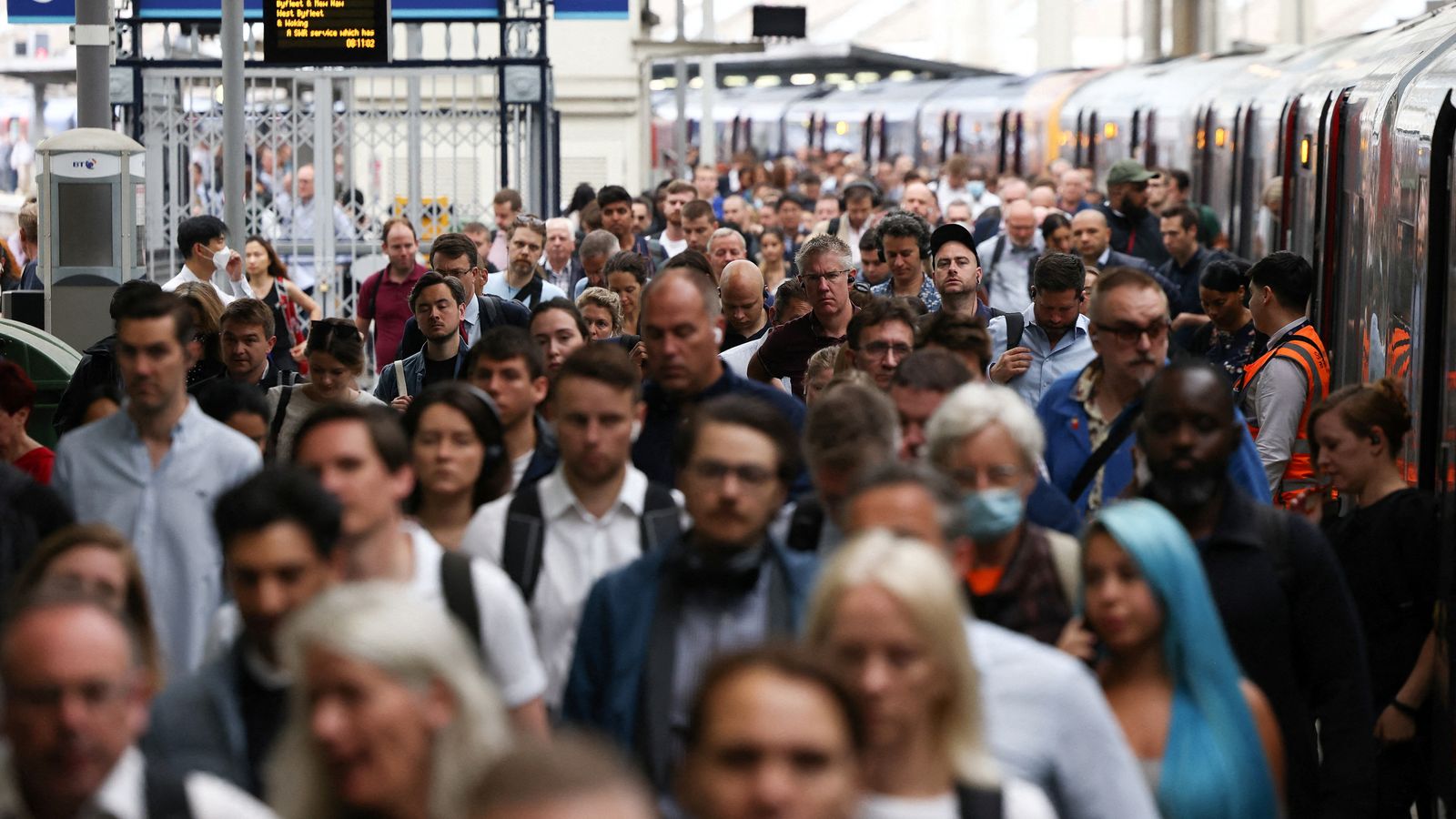Rail companies had wanted to shut almost all of England’s 1,007 train station outlets. But the plans prompted uproar from unions, charities and passenger groups.
By Jennifer Scott, political reporter, and Daniel Binns, news reporter
The government has cancelled rail industry plans for the mass closure of ticket offices in England, saying they failed to reach the “high threshold of serving passengers”.
The Rail Delivery Group (RDG) announced over the summer that it intended to shut almost all of the nation’s 1,007 train station outlets in an effort to reduce costs after a post-COVID fall in passenger numbers.
Ministers had previously backed the proposals, despite concerns from unions and charities over the impact on vulnerable passengers such as disabled people.
But in a statement given to Sky News this morning, Transport Secretary Mark Harper confirmed he had asked train operators to “withdraw their proposals” following a public consultation.
A rail company source told the PA news agency there was “quiet fury” in the industry about the move.
They added: “The plan was signed off by civil servants and ministers. They’ve U-turned.”
But RMT union general secretary Mick Lynch hailed the decision as a “resounding victory” for the campaign against the closures.
The government announcement on Tuesday came after watchdogs Transport Focus and London TravelWatch said they opposed every single planned closure due to concerns over the impact on passenger accessibility.
Last week the cross-party transport committee of MPs also warned the plans went “too far, too fast” and described the consultation as lacking in transparency.
Prime Minister Rishi Sunak said in September that closing ticket offices was “the right thing for the British public and British taxpayers” because “only one in 10 tickets are sold currently in ticket offices”.
But Mr Harper said in his statement on Tuesday that the government had made clear to the industry throughout the consultation that its proposals “must meet a high threshold of serving passengers”.
He added: “We have engaged with accessibility groups throughout this process and listened carefully to passengers as well as my colleagues in parliament.
“The proposals that have resulted from this process do not meet the high thresholds set by ministers, and so the government has asked train operators to withdraw their proposals.
“We will continue our work to reform our railways with the expansion of contactless Pay As You Go ticketing, making stations more accessible through our Access for All programme and £350m funding through our Network North plan to improve accessibility at up to 100 stations.”
‘Disastrous and discriminatory’
Transport Focus’s chief executive Anthony Smith said there had been around 750,000 responses to the consultation.
He said the watchdog decided to object due to “serious overall concerns” about the plans and questions over how the impact of closures would be measured.
Mr Smith added: “Some train companies were unable to convince us about their ability to sell a full range of tickets, handle cash payments and avoid excessive queues at ticket machines.”
Read more from Sky News:
COVID inquiry latest: Boris Johnson ‘wrong PM for COVID’
Gold to sell 10% stake in Premier League side West Ham
UK weather: More warnings issued for parts of England
Katie Pennick, campaigns manager at accessibility charity Transport for All, said: “While we are proud of the incredible tenacity of disabled people and our community for securing this major campaign victory, the outcome is bittersweet.
“The disastrous and discriminatory proposals should never have been put forward.”
Labour’s shadow transport secretary Louise Haigh described the U-turn as a “humiliating climbdown”.
“These shambolic plans have fallen apart under scrutiny,” she said.
It comes amid a long-running dispute between operators and unions over staff pay and conditions – along with concerns over ticket office closures – which have led to months of strikes on the network.
The government announcement has now raised hopes there could be an impact on talks to resolve the dispute, with the RMT union calling for an “urgent summit” between the government, train companies and passenger groups following the U-turn.
Rail ticket office closures cancelled
It said there was a need to “agree a different route for the rail network that guarantees the future of our ticket offices and station staff jobs, to deliver a safe, secure and accessible service that puts passengers before profit.”
The RDG, which represents rail companies, defended its proposals as being an attempt to balance the “changing needs of customers” with the “significant financial challenge faced by the industry” post-COVID.
Chief executive Jacqueline Starr said: “While these plans won’t now be taken forward, we will continue to look at other ways to improve passenger experience while delivering value for the taxpayer.
“Our priority remains to secure a vibrant long-term future for the industry and all those who work in it.”

Robert Johnson is a UK-based business writer specializing in finance and entrepreneurship. With an eye for market trends and a keen interest in the corporate world, he offers readers valuable insights into business developments.








